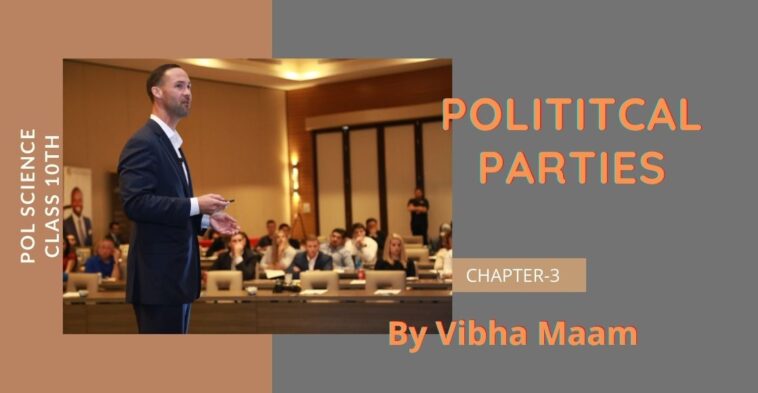Checkout handpicked notes of NCERT class 10th Political Science Chapter 3 Political Parties notes by Vibha Madam and don’t forget to share your valuable comments in the comment below to motivate our author.
Meaning of Political Party
A political party is a group of people who come together to contest elections and hold power in the government. political parties reflect fundamental political divisions in a society. Parties are about a part of the society and thus involve partisanship.
A political party is known by which party it stands for, which policies it supports and whose interest it upholds.
Components of the Political Parties
- The leader
- The active members
- The followers
Functions
- Parties contest elections by selecting their candidates in different ways:- in the USA, members and supporters of a party choose its candidates and in India, top party leaders choose candidates for contesting elections.
- Political parties put forward different policies and programmes.
- Parties play a major role in making laws.
- Parties form and run government
- The parties that loss in election play the role of opposition
- Parties shape public opinion
- Parties provide people access to government machinery and welfare schemes
Why do we need political parties?
We need political parties because they perform all the functions which are necessary for a democracy. Without political parties, every candidate in the election will be independent, so no one will be able to make any promises to the people about any major policy change. government will remain ever uncertain,
no one will be responsible for how the country will be run.
How many parties should we have?
- One-Party system ruled in China, where the electoral system does not permit free competition for power. It is not a good option as this is not a democratic option.
- Two-party system ruled in the USA and UK, where only the two main parties have a serious chance of winning a majority of seats to form government.
- Multi-party systems ruled in India, where the government is formed by various parties coming together in a coalition. This system allows a variety of protests and opinions to enjoy political representation.
Kinds of Political Parties and criteria
National Parties
National parties are countrywide parties, which have their units in various States but all their units follow the same policies and programs that are decided at the national level. a party that secures at least 6% of total votes in the Lok Sabha election or Assembly elections in four states and wins at least four seats in Lok Sabha is recognized as a National Party.
In India, we have eight national parties (as per 2019):
- Indian National Congress (INC), (1885)
- Bharatiya Janata Party (BJP), (1980)
- Bahujan Samajwadi Party (BSP), (1984)
- Communist Party of India -Marxist(CPI-M), (1964)
- Communist Party of India (CPI),1925
- National Congress Party ( NCP), (1999)
- All India Trinamool Congress (AITC),(1998) and •The National People’s Party (NPP),(2012)
State Parties or Regional parties
State parties are commonly referred to as regional parties. A party that secures at least 6% of the total votes in an election to the Legislative Assembly of state and wins at least two seats is recognised as a State Party, for example Samajwadi party, Rastriya Janata dal, DMK, AIADMK etc.
Challenges to Political Parties
There are some major problems in the working of political parties:-
- Lack of internal democracy within parties- Parties do not conduct internal election regularly, only few leaders exercise paramount power in the party.
- Dynastic succession- The top positions of the party are always controlled by members of one family.
- Money and muscle power- Especially during elections, parties are focused only on winning, they tend to use shortcuts to win elections. In some cases, parties support criminals who can win elections.
- Meaningful choice to the voters- There has been a decline in the ideological differences among parties.
- Corrections- Party leaders often misused their powers and positions.
How can parties be reformed?
There have been some steps taken by constitution to reform political parties and its leaders:-
Defection:- It is important to reform or strengthen the political parties, so the constitution was amended to prevent elected MLAs and MPs from changing parties (defection).if any MLA or MP changes parties, he or she will lose the seat in the legislature.
Affidavit and Income Tax Return:-The Supreme Court passed an order to reduce the influence of money and criminals, it is compulsory for every candidate to file an affidavit of his / her property and income tax return.
Besides these, many suggestions are there for parties
- A law should be made to regulate the internal affairs of political parties and give about one-third seats to women candidates.
- There should be state funding of elections. This support would be given in kind: petrol, paper, telephone, etc. or it could be given in cash on the basis of the votes secured by the party in the last election.
- There are two other ways in which political parties can be reformed. i) People can put pressure on political parties through patient publicity and education and ii) Political parties can improve if those who want this join political parties. The quality of democracy depends on the degree of public participation.
Conclusion
Parties are the most visible face of democracy. it is natural that people blame parties for whatever is wrong with the working of democracy. political parties need to face and overcome the challenges in order to remain effective instruments of democracy. The problem of bad politics can be solved by involving ordinary citizens.
Don’t forget to comment in the comment section below to appreciate and motivate our author by sharing this notes with your friends you can also Contact us for any query or if you are interested in writing with us.
Use Canva for amazing images.
Stay tuned for more amazing stories, poems & articles like this.
For sponsor any article or your article you can mail us with your logo ready and details.











Such a nice way to express the whole chapter in these simple words 👍👍👍
thanks mam for this valuable notes
Awesome notes